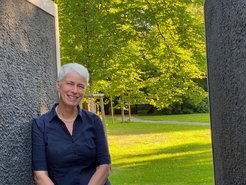Passion for Science and Management
Minerva’s daughters: Dr. Verena Schultz-Coulon is Head of Administration at the Institute
While studying chemistry, Dr. Verena Schultz-Coulon realized that she was not only interested in science itself, but also in science management. She has been Administrative Director at the Max Planck Institut für Kohlenforschung since 2020.

Dr. Verena Schultz-Coulon has been Head of Institute Administration for almost four years now. In our interview series "Minerva's Daughters", the chemist talks about how she came to work at the Kohlenforschung and what she finds appealing about her job.
What brought you here? Tell us about your way to the Kohlenforschung!
Dr. Verena Schultz-Coulon: I am a chemist and I had known about the MPI für Kohlenforschung for some time. When I saw the job advertisement for the Head of Administration, I applied and was accepted. I was very happy about that. I had previously worked in various positions in science management at the University of Heidelberg. I realized early on that I was not only interested in science, but also enjoyed organizing and planning. For example, when my supervisor's group moved from Bonn to Bayreuth, I was allowed to take care of many organizational matters.
What do you like about your work?
Dr. Verena Schultz-Coulon: What I particularly like is the variety of topics that we work on every day. I also really enjoy the people who are so passionate about the institute. I also find the special responsibility and freedom that we have been given as a foundation very appealing. The Kohlenforschung is something special within the Max Planck Society. I probably wouldn't have moved from Heidelberg University to any other Max Planck Institute.
What are your professional goals?
Dr. Verena Schultz-Coulon: I would like to help continue the successful dialog between science, workshops, technology and administration and keep the Institute fit for the future and competitive. This is currently an ideal time for this, with the upcoming implementation of campus planning and the comprehensive digitalization of administrative processes.
What has been your most difficult step so far?
Dr. Verena Schultz-Coulon: It was actually not easy for me to find a job after I had finished my doctoral thesis. At the time, our daughter was still very small and many companies found it difficult to hire young mothers. I only found a job after attending further training for scientists, which included project management. Fortunately, these soft skills are now part of university education, but that wasn't the case back then.
Do you have a role model?
Dr. Verena Schultz-Coulon: Both my grandmothers and my mother are great role models for me. All three women, for different reasons, had to make their way pretty much on their own. They never gave up and managed very well despite some very adverse circumstances. I find that incredibly inspiring.
What advice would you give to young girls who are interested in working in a scientific institution?
Dr. Verena Schultz-Coulon: If young women are interested in science, they should definitely dare to try out this path and see how far they get. But that's advice I would also give to young men. Apart from that, I can only advise young people to network and exchange ideas with each other, whether in a study group at university or among colleagues. It's helpful when you're stuck. And it's always a good idea to tackle problems together.
If you had one wish: What would it be?
Dr. Verena Schultz-Coulon: I would like us as a human race to show much more composure and tolerance. That's what we need to significantly reduce the number of conflicts in the world.












